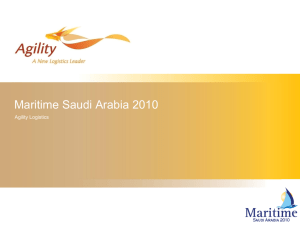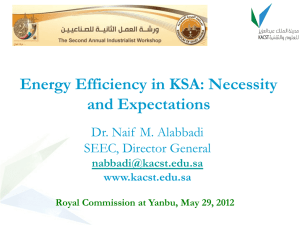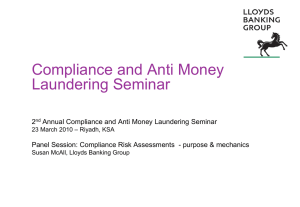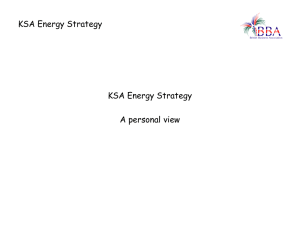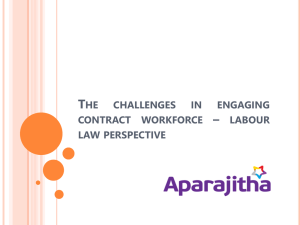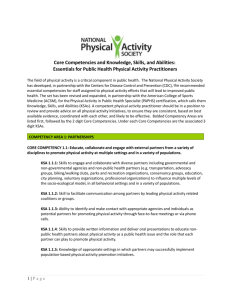An introduction to Construction laws in the Kingdom of Saudi Arabia
advertisement
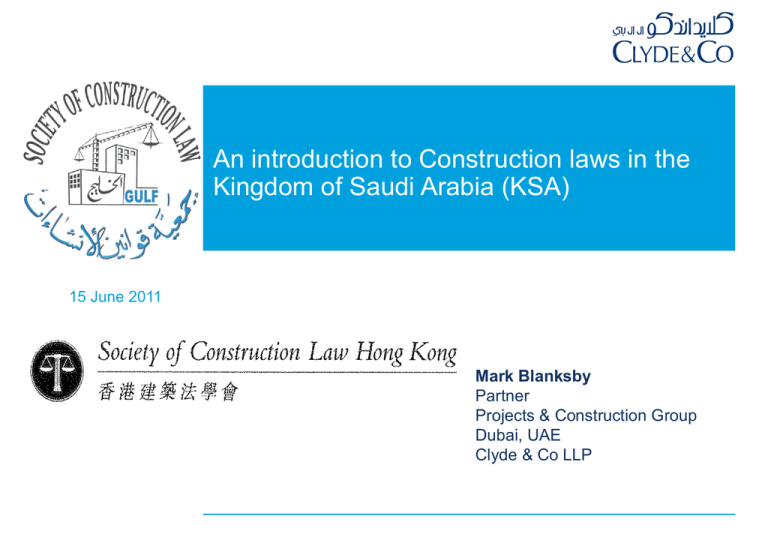
An introduction to Construction laws in the Kingdom of Saudi Arabia (KSA) 15 June 2011 Mark Blanksby Partner Projects & Construction Group Dubai, UAE Clyde & Co LLP Today’s talk Chinese contractors in KSA Won over 50% of $5.2billion rail spend 2009 - (Forbes 2009) China Rail Construction Corporation $1.8 billion “Mecca Metro” China Guangdong Overseas Construction Group Company Limited $612 million “King Khalid University” China Harbour Engineering Company Limited, China National Petroleum Corp, Aluminium Corporation of China KSA infrastructure budget 2011 Population quadrupled over 25yrs Social infrastructure spend to surpass $155 billion over next few years Including education and healthcare facilities Amongst the lowest public debt levels in the world - (reported in Construction Week Online March 2011) Basic Principles Please insert / update footer Basic principles KSA is a sovereign Arab Islamic state. KSA law is based on Shari'ah law from two main sources: - Holy Qur'an - divine revelations to the Prophet Mohammed - Sunnah - the record of sayings and actions of the Prophet Mohammed. There is no Civil Code in KSA. The KSA Government will issue specific laws and regulations when necessary to supplement Shari'ah Law. Key elements of Shari’ah law Freedom of Contract: parties are generally free to negotiate their own terms except where the activities are expressly prohibited. Fairness and Good Faith: parties must observe fairness and equity in their dealings. Uncertainty: no elements of deception or excessive uncertainty (gharar). Speculation: no gambling or speculation on a future outcome (maisir). Agreements to Agree: will not be acceptable if excessively uncertain as to key elements of a future obligation. Unjust Enrichment: no party is to gain unjustly in a contract at the expense of another. Interest: clauses in contracts which provide for payment or receipt of interest will generally not be enforceable. An exception to this general principle allows interest provisions in banking transactions to be enforced by the Saudi Arabian Monetary Authority Banking Disputes Settlement Committee. Sovereign immunity: KSA Government entities are capable of being sued in KSA in respect of their commercial and private acts. Language: Contracts need to be in Arabic or they will not be admissible In KSA Courts or Judicial Committees. Translations into Arabic must be certified by a KSA certified translator. Construction laws Please insert / update footer Introduction Private contracts – generally free to negotiate terms Government contracts – subject to more stringent requirements Key KSA Government Laws: Government Tenders and Procurement Law (2006) Public Works Contract (1988) Draft Public Construction Contract (2010) Saudi Building Code (SBC) Government Tenders and Procurement Law: General statute applying to all government construction projects Prescribes standard form contract (PWC), (which may be replaced soon by PCC) Project-specific special conditions may amend standard form Structure Specific Special Conditions [NEW] Public Construction Contract Government Tenders Law General laws of KSA General Government Tenders Law Background Aims promote honesty, transparency, economic efficiency and competition GTL covers similar ground to “muqawala” provisions in UAE Civil Code - Contracts in Arabic - Requires the use of approved forms - Imposes a decennial liability obligation - Requirements re: advance payment/ delay damages/ retention but Largely a starting point for discussion Government Tenders Law – detail Key provisions Article 27: - Contracts shall be interpreted and executed in Arabic, even if drafted in another language. Article 28: - When drafting contracts, government authorities shall use approved contract forms Article 31: - Where contract value is less than SAR 300,000 (US$80,000) an exchange of letters may be used in lieu of the government contract. Government Tenders Law - detail Key provisions Article 33: - Successful bidder shall submit a 5% bank guarantee (subject to certain exceptions for majority government owned entities and charities) Article 36: - Positive variations exceeding 10% and negative variations exceeding 20% are not permitted. Article 38: - Advance payments may not exceed 5% or SAR 50 million. Government Tenders Law - detail Key provisions Article 40: - Last claim for payment shall not be less than 10% for public works and 5% for other contracts - i.e. effectively retention monies Articles 48 – 52: - Penalties imposed for delay in certain circumstances (up to 6% in supply contracts and 10% in other contracts). - i.e. set cap imposed on Employers Government Tenders Law - detail Key provisions Article 76 - “A contractor shall provide a ten-year warranty against partial or full collapse of what he constructs starting from the date of final handover to the Government Authority, if such collapse is due to a construction defect, unless the two contracting parties agree on a shorter period” No general decennial provision under KSA law (cf. Article 880 of UAE Civil Code) - Strict liability for Contractors on government projects only - No decennial liability on private projects or for Engineers / Architects but… - No concept of limitation periods in KSA Public Works Contract (1988) Background Issued in 1988 under an older version of the Government Tenders Law Based on FIDIC 3rd edition (1977) Still the currently-approved standard form construction contract for public works Consists of: - Section 1 – Contract Agreement - Section 2 – General Conditions Special (particular) Conditions may also amend General Conditions - Limits of this unclear (Article 28, Government Tenders Law) - Current projects suggest extensive revision possible Public Works Contract (1988) - detail 1. Key features: Parties / roles Employer - Also referred to as “Ministry” or “administrative authority” in contract Contractor Engineer - Supervision role, e.g. inspection of works (Section 2, Article 30) - No duty of impartiality (Section 2, Article 2) Public Works Contract (1988) - detail 2. Key features: Site risks Contractor has obligation to inspect site and notify the Employer of any latent adverse physical conditions within 10 days after they are discovered (Section 2, Article 11) - Failing to do so waives right to compensation Contractor has obligation to review Engineer’s design and notify Employer of any defects in design (Section 2, Article 10) - May require engagement of external design consultant Public Works Contract (1988) - detail 3. Key features: Subcontracting Contractor responsible for the performance of all Subcontractors Contractor may not engage Subcontractors without prior written approval of Employer - Approval does not mean performance at Employer’s risk - No provision for provisional sums / nominated subcontractors Foreign Contractor must: - employ Saudi contractors for not less than 30% of the works, unless exempted by MoF - purchase all equipment and tools in KSA unless second-hand, plus various services (transportation, insurance, airlines etc.) (Section 2, Articles 4 and 12) Public Works Contract (1988) - detail 4. Key features: Time Contractor must submit work programme and work method statements (Section 2, Article 13) Contractor commits to set contract duration which commences upon the handing over of the site (Section 1, Article 3(1)) Failure to complete on time gives rise to liability for: - delay penalties (Section 2, Article 39), and - supervisor’s costs and fees (Section 2, Article 40). (Section 1, Article 3(2)) Public Works Contract (1988) - detail Key features 4: Time cont… EOTs granted by reference to separate law (Section 2, Article 36) - i.e. Article 9, Law of Securing Government Procurement and Executing Projects and Works Thereof Article 9(1) – delay penalties not payable if delay caused by: - force majeure or emergency event - “cause beyond the will of the contractor” (not defined) Article 9(2) – EOT may be granted if delay due to: - instructions for extra works meaning time for completion cannot be achieved, or - suspension not caused by Contractor Public Works Contract (1988) - detail 5. Key features: Delay penalties Calculated for each day based on “average daily cost of the project” - e.g. If Contract Price SAR 100,000 and contract duration is 100 days, the average daily cost is SAR 1,000 Delay penalties levied by period - 1st period (up to 15 days or 10% of contract term): DPs are ¼ average daily cost per day - 2nd period (up to 30 days or 15% of contract term): DPs are ½ average daily cost per day - 3rd period (remainder): DPs are full average daily cost per day Public Works Contract (1988) - detail Delay penalties cont… Delay penalties capped at 10% of the value of the contract No relationship between Employer’s actual costs and delay penalties (unlike LDs)! (Section 2, Article 39) 6. Key features: Supervision Costs during delay Contractor obliged to bear fees of supervising Engineer for the period of the delay, calulcated on the basis of the supervising Engineer’s contract (Section 2, Article 40) Public Works Contract (1988) - detail 7. Key features: Variations Engineer must obtain prior agreement from Employer before instructing change - No statement that Contractor may assume this has been done (cf. FIDIC) Change may be to shape, type or quality of the works or any part but must be in written order of Engineer Instruction may not: - “change the object of the contract” (not defined) - Overstep set limits, i.e. - Maximum increase is 10% of contract value - Maximum decrease is 20% of contract value - (cf. Article 36 of the Government Tenders Law) (Section 2, Article 43) Public Works Contract (1988) - detail 8. Key features: Suspension Employer’s rights (Section 2, Article 32) - may suspend indefinitely - not responsible for the extra cost of suspension if the suspension is: - provided for in the Contract, - necessary for the proper execution of the works, - necessary by reason of climatic conditions, - necessary by reason of some default on the part of the Contractor, or - necessary for the safety of the works. Contractor’s rights - no right to suspend Public Works Contract (1988) - detail 9. Key features: Termination Employer’s rights - may “withdraw the works” if slow progress, abandonment of the works, breach and no remedy within 15 days, improper gift to government or insolvency - Contractor liable for extra costs (Section 2, Articles 53 and 54) Contractor’s rights - no right to terminate - Contractor has right to sue for breach if claim made within 30 days (Section 2, Article 59) Public Works Contract (1988) - detail 10. Key features: Disputes All disputes go to the Board of Grievances - No multi-tiered dispute resolution process (i.e. Engineer’s decision, followed by amicable settlement etc.) - No arbitration Draft Public Construction Contract (2010) Released in April 2010 by Ministry of Finance to replace Public Works Contract (1988) Influenced by FIDIC “Red Book” 1987 standard form but some significant departures, such as: - Engineer’s role constrained to technical matters (e.g. variation orders to be given by Employer direct) - Contract price varies with changes in underlying costs (!) No indication as yet as to when this will be enacted Saudi Building Code Deals with: architectural requirements, loads and forces, testing and inspection, soil and foundations, concrete structures, masonry structures, Relates steel structures, electrical requirements, mechanical requirements, energy conservation, sanitary requirements, and fire protection to both public and private sector construction projects Dispute resolution Please insert / update footer Dispute resolution options in KSA The “Court” System Local arbitration in KSA Court / Arbitration outside KSA ADR ? 1. The Court System in Saudi Arabia 3 types of dispute resolution body SHARI’AH COURTS Court of First Instance Court of Appeal Supreme Court • Criminal / Family / Civil disputes BOARD OF GRIEVANCES Court of First Instance Board of Grievances Appeal 1 Board of Grievances Appeal 2 • Commercial / Government disputes QUASI JUDICIAL COMMITTEES Court of First Instance Committee Level 2 Board of Grievances • Disputes in specified industries (e.g. SAMA – banking disputes) 1. The Court System – detail Judges Male, Muslim, Shari’ah trained but no requirement for any other legal training Board of Grievances and Committees may call on expert advisers Procedure (Commercial Disputes) Commenced by filing a case at Board of Grievances Inquisitorial Parties called to a series of hearings and allowed to make: submit written evidence make oral submissions 2. Local Arbitration – Saudi Arabia Arbitration Act 1983 Implementing Regulations to the Arbitration Act 1985 - Provides basic framework for conduct of arbitration - Gaps in Arbitration Laws filled in by Supervising Court by reference to Shari’ah Law Government entities cannot arbitrate (Act art 3) Special dispensation must be given by Chairman of the Council of Ministers (Regs art 8) Advance approval: Draft Ministry of Finance Construction Contract (Clause 91.3) 2. Local Arbitration – key features Court involvement at each stage of arbitration Must satisfy Court that there is a valid arbitration agreement Choice of Law Clauses not recognised – must apply Saudi Law Arabic language is compulsory (Regs art 25) Tribunal must be male and muslim (Act arts 4 & 12, Regs art 3) Not private (Regs art 20) Award within 90 days unless parties agree otherwise (Act art 9) Award not final – reviewed by Supervising Court (Act arts 18 & 19) Enforcement via order of the Supervising Court (Act art 20) 3. Court / Arbitration outside KSA Common between parties from outside KSA Only an issue if requiring enforcement within KSA Enforcement: Pursuant to KSA legislation Pursuant to International Treaties 3. Enforcement of Foreign Court Judgments Enforcement pursuant to KSA Legislation: Royal Decree No M/51 dated 11 May 1982 (arts 8 & 6) Board of Grievances Regulations 2007 (art 13) Grants Board of Grievances authority to hear applications for enforcement of foreign Court judgments in Saudi Arabia Conditions for enforcement - Foreign judgment may not be contrary to Saudi Shari’ah Law - The enforcing party must show that the country in which the judgment was made would enforce judgments of the Saudi Courts 3. Enforcement of Foreign Arbitration Awards Enforcement pursuant to International Treaties New York Convention 1958 - Recognition and enforcement of foreign Arbitral Awards - Implemented in Saudi Arabia in 1994 - IF not contrary to Shari’ah / Saudi Law - Reciprocity reservation - Historically some difficulty in satisfying reciprocity reservation. - Judgment 4/D/F/20 of 1992: Saudi Courts refused to recognise a judgment of the English High Court on the grounds of nonreciprocity 1983 Riyadh Convention & 1995 GCC Convention Which forum to chose ? Generally not an issue between international parties. Should be a prime focus if contracting with a KSA party Legal argument can include subjective interpretation of verses of the Qu’ran and Sunnah No binding system of precedent / no official publication of rulings Lack of procedural guidelines on timescales can lead to delays + no recovery of legal costs Historically KSA judges have been non-specialist Language ……. can lead to uncertainty of outcome in KSA Conversely, the enforcement of an overseas judgment / Award is not without its difficulties……… Which forum to chose ? Therefore: Price the Risk Consider submission to the Court of Grievences Consider arbitration in a GCC State (e.g. UAE, Bahrain) - Where established set of arbitration rules - With KSA qualified lawyer on the Tribunal - With KSA law as the substantive law of the Contract - Enforcement within KSA governed by local Treaties Thank you
